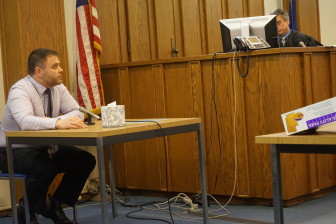
Nancy West photo
Dr. Matthew Davis is pictured testifying at Eric Largy’s recommittal hearing on Thursday in Merrimack County Probate Court with Probate Judge David King on the bench.
A state psychiatrist provided surprising testimony on Thursday when he disagreed with three other psychiatrists who testified that Eric Largy still suffers from delusional disorder and should be involuntarily committed for another five years.
When asked by Largy’s attorney, Shane Stewart, whether Largy suffers from delusional disorder, Dr. Matthew Davis responded at the recommittal hearing in Merrimack County Probate Court:
“I’m uncertain. In the time that I’ve treated Mr. Largy and been in charge of his care at New Hampshire Hospital, I’ve not seen any evidence of delusions based on my interviews with him.”
Largy, 49, was locked up in the Secure Psychiatric Unit at state prison on civil involuntary commitments for five and a half years before being transferred to the less restrictive New Hampshire Hospital three weeks ago. If Probate Judge David King denies the recommitment, Largy could be discharged as soon as Monday.
Largy also spent a year and a half at the Valley Street Jail in connection with the April 22, 2009, beating of his father, retired Nashua Police Chief Clifton Largy, before criminal charges were dropped and he was found incompetent to stand trial.
Police reported at the time that Largy tortured his father for 12 hours and restrained him in an antique barber chair. The senior Largy suffered a broken jaw and broken eye sockets.
Eric Largy maintained he was defending himself against an abusive father that day. Eric has insisted the senior Largy abused him all of his life and used his political clout to deny him his day in court by having him civilly committed instead.
Clifton Largy previously denied all of his son’s allegations to InDepthNH.org, but could not be reached Thursday evening for comment.
Clifton Largy told police at the time — and more recently told InDepthNH.org — that he was lured to his son’s home and hit from behind in a premeditated attack.
Dr. Davis’ findings
Dr. Davis recommended against a five-year commitment. Although it would allow for early conditional release, Davis doubted it would be helpful since Largy has refused treatment in recent years and insists he is not mentally ill.
“There’s not been any delusional material that’s been shared,” Davis told the court.
“In observations from staff that have been reported to me, there’s not been any evidence of delusional content to his thoughts,” Davis said.
Under questioning by the hospital’s attorney Lynne Mitchell, Drs. Edward Drummond, Robert Murray and Daniel Potenza all testified in favor of the five-year recommitment. They still believe Largy suffers from delusional disorder. The diagnosis was cited when he was deemed incompetent and when he was involuntarily committed.
Open hearing
Largy appeared slightly sunburned and wore navy blue exercise pants and a jacket over a white sport shirt to the hearing. He was free of the handcuffs and shackles he wore into court when dressed in a prison uniform at a hearing on March 31 when he was still a patient at the Secure Psychiatric Unit.
Recommittal hearings are usually strictly closed to the public and press, but Largy asked to have his case open to InDepthNH.org. Largy said he wants to shine light on what he considers law enforcement’s “dirty little secret” of protecting their image from being tarnished by allegations of domestic violence.
All four psychiatrists testified that Largy has always acted appropriately during his commitment. They described him as polite and cordial and someone who helped other patients who were being victimized.
Largy had been charged with first-degree assault and kidnapping. The charges were dropped, but could be reinstated any time before the statute of limitation runs out in April of 2018. With possible criminal charges hanging over his head, Largy said he is reluctant to discuss the incident with his father.
Judge’s questions
During Dr. Murray’s testimony, Stewart pointed out that he had been Largy’s substitute doctor for only a week and a half while Davis was away.
If Eric Largy is telling the truth that his father attacked him that day and also used his position to influence his case – both of which the senior Largy adamantly denies — then Eric isn’t delusional, Stewart said.
“You don’t know whether Clifton Largy attacked Eric or not, do you? You have no idea whether Eric’s story is truthful, do you?” Stewart asked.
Murray responded: “I have no direct knowledge of that.”
Murray stood by Largy’s original diagnosis and the recommendation of a five-year recommitment, pointing out Largy’s refusal to engage in treatment in recent years.
From the bench, Probate Judge David King also questioned Murray.
“In a situation where someone goes for an extended period of time with no incidents of a negative flavor if you will, and he refuses any interaction with the treaters, is there ever a recommendation that they just get out? Or do they get a life sentence because they refuse treatment?” King asked.
Murray said it wouldn’t be fair to call it a life sentence. What Murray would be looking for to discharge a patient would be a sincere investment in an aftercare plan or a sufficiently long probate commitment with the potential for a conditional discharge.
King asked how long a commitment. Murray said it depends on the individual.
“That could be in a week or two or it could take much longer for other patients,” Murray said, adding he would expect the patient to have a real investment in giving the aftercare plan a try.
King responded: “So if they never (have) that investment, they never get a recommendation for discharge.”
Murray responded: “Yeah, it becomes hard.”
Dr. Daniel Potenza testified that Largy could be dangerous if released to the community.
“If Mr. Largy were to be discharged without a treatment plan, I think that there is a serious likelihood he would be a danger to himself or others,” Potenza said.
After the hearing, Stewart said he is optimistic the judge will not order a five-year commitment. Largy’s current commitment runs out on May 15.
“(Dr. Davis) doesn’t believe Eric meets the involuntary admission standard,” Stewart said.
Stewart said he was pleased that Dr. Davis took the stand and stated what he believes as a doctor. “I was impressed that he had the courage to do so,” Stewart said. “I was surprised that he didn’t just concur with the other three doctors.”
Largy didn’t testify, but after the hearing said he doesn’t want to get his hopes up too high. He criticized the psychiatrists for saying he has refused psychological testing and treatment.
“I have been psychologically tested for seven and a half years,” Largy said. “My behavior speaks for itself.”





